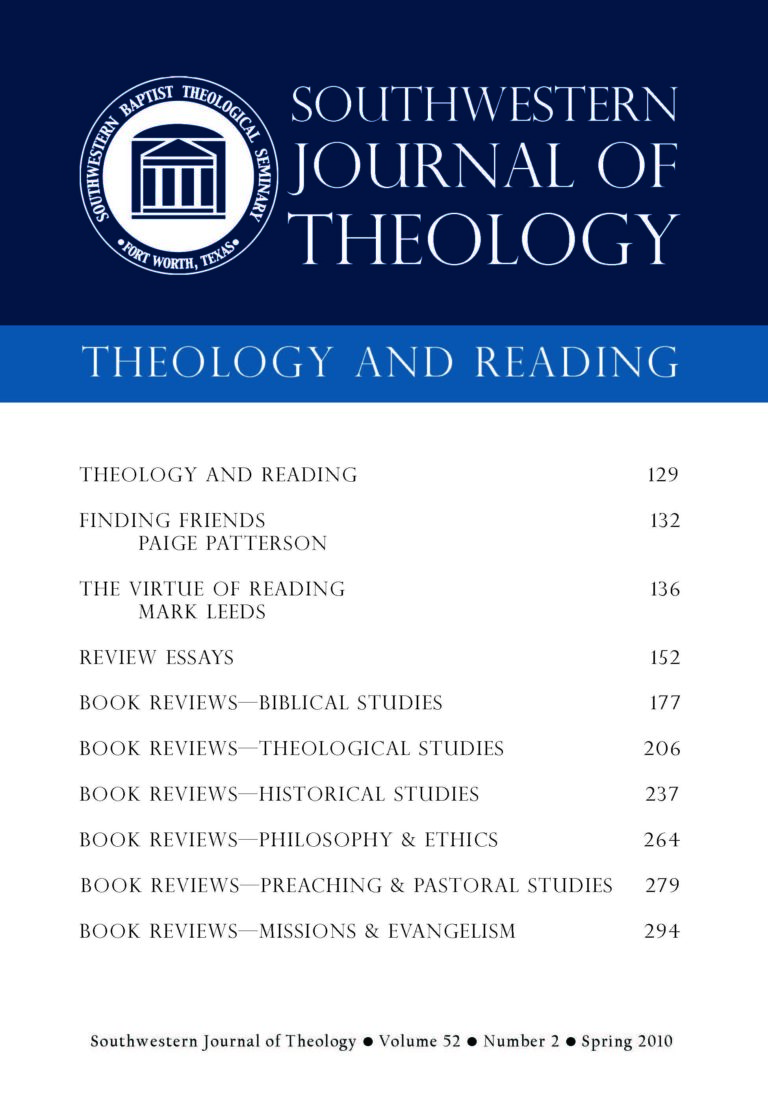
Theology and Reading
Southwestern Journal of Theology
Volume 52, No. 2 – Spring 2010
Managing Editor: Malcolm B. Yarnell III
By Geoffrey W. Grogan. The Two Horizons Old Testament Commentary. Grand Rapids: Eerdmans, 2008. 490 pages. Softcover, $25.00.
This work is a volume in the commentary series intended to combine both theological exegesis and theological reflection. The stated aim of the series is to assist students and pastors “in theological interpretation of Scripture” (ii). Grogan’s work has aptly met that challenge. His work is theologically conservative, well-documented, exegetically acute, and pragmatic. The strength of the work is Grogan’s demonstration of the interconnectedness among the individual Psalms, as well as between the book of Psalms and the rest of Scripture (See especially 142, 147–48, 176, 211, 222). Grogan reveals the order apparent in the arrangement of the Psalms (cf. 46, 48, 60, 232, et al), and also the significance of the original contexts of them (72). He affirms that both the complete book as well as each individual psalm is the Word of God and, as such, authoritative.
The format of the book is simple. The first part of the book is an exegesis of the Psalms within the five books, followed by theological horizons in the second main section. In the exegetical section, each psalm is given a brief overview which addresses some of the critical issues and background concerns, followed by a discussion of the verses within the psalm. Grogan does a good job of delineating important issues of each psalm as well as their use of language. However, the space constraints do not allow the work to delve in detail into the theological issues as much as some students might prefer.
Grogan attempts to accomplish a great deal in this one volume, especially with a book as comprehensive and complex as Psalms. As such, the work runs the risk of leaving both teachers and preachers frustrated. On the other hand, a number of features make this volume attractive. First, the format is generally easy to follow. Next, there are a number of helpful discussions and excuses: including those on superscriptions (8–10), the genre of the text (10–18), the meaning of the phrase, “of David” (34), suggestions on the use of Psalms today (33), the Davidic Psalms (34), grammatico-historical interpretation (41–42), retribution theology (91), theodicy (98, 335), Messianic prophecy (184–85, 348, 352–59), authentic worship (342–48), open-theism, in which he flatly denies open theism, while affirming the impact of prayer (370–73), the impact of Christ and His work (387– 95), the role of the Holy Spirit in the believer’s life (396–403), and the authority of Scripture (424–30). In addition, the appendix includes a useful discussion on preparing a sermon on the Psalms, giving strong emphasis to exegesis and application.
The section on the themes is thorough and practical. The author outlines the key themes of the book as well as the overall contribution of Psalms to biblical theology today. Moreover, he provides useful suggestions for further study and practical tips for the instruction of the Psalms.
Grogan successfully navigates the perceived tenuous waters between scholarship and practical application, bridging the two with the skill of a scholar and the heart of a pastor. Pastors and students will find this volume a helpful addition to their library.





